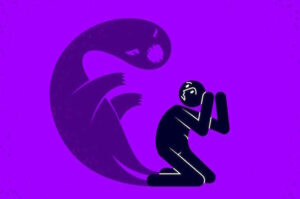Bipolar disorder is a mental illness that affects millions of people all over the world. It can be difficult to diagnose because the symptoms can vary from person to person. One common symptom of bipolar disorder is delusions. In this blog post, we will discuss what bipolar delusions are, and how they affect people with this illness. We will also explore ways to cope with these delusions and get the help that you need.
Contents
Defining Bipolar Delusion
Bipolar disorder is a mental illness that causes dramatic shifts in mood, energy, and activity levels. People with bipolar disorder can have periods of manic highs, where they feel extremely happy and energized, followed by depressive lows, where they feel hopeless and sluggish. These mood changes can be so extreme that they interfere with a person’s ability.
Believing in things that aren’t genuine may distance you from the actual world and make you unhappy. Your inability to set aside an untrue belief could have an impact on your job, social interactions, and other areas of your life.
Delusion is often characterized the beliefs that are not based in reality and fixed beliefs that don’t change, even when presented with evidence to the contrary. A strong belief in something despite evidence to the contrary of unusual or eccentric behavior as a result of the delusion.
A person with bipolar disorder may believe that they:
- are famous when they are not
- have a special relationship with a celebrity or public figure
- have unique and special powers are being followed or watched by someone
Bipolar delusions can be frustrating and confusing for both the person experiencing them and their loved ones. It’s important to remember that delusions are a symptom of an underlying mental illness and are not the result of poor judgment or a lack of intelligence.
Types Of Bipolar Delusion

There are various types of bipolar delusion which can be experienced by an individual during a manic or depressive episode. The most common types of delusion are:
Grandiose delusions
These involve feeling inflated self-importance, power, and success. For example, thinking you are a celebrity or that you have superpowers.
Persecutory delusions
These involve feeling that you are being persecuted, watched, or followed. For example, thinking that people are plotting against you or that they can control your thoughts.
Reference delusions
These involve feeling that certain events or people have a special meaning for you. For example, thinking that a song on the radio is specifically about you or that a stranger is sending you secret messages.
Somatic delusions
These involve feeling that there is something wrong with your body or that you have a serious illness. For example, thinking that you have cancer or that you are going to die.
Nihilistic delusions
These involve the feeling that the world is ending or that you no longer exist. For example; thinking that you are already dead or that the world has been destroyed.
Bipolar delusions can be extremely distressing and may lead to self-harm or suicide if not treated. If you think you or someone you know is experiencing a delusion, it is important to seek professional help immediately.
Signs And Symptoms
 There are various signs and symptoms of bipolar delusion. It is important to remember that not everyone will experience the same symptoms and that the severity of symptoms can vary from person to person. Some common signs and symptoms include:
There are various signs and symptoms of bipolar delusion. It is important to remember that not everyone will experience the same symptoms and that the severity of symptoms can vary from person to person. Some common signs and symptoms include:
- feeling overly happy or “high” for long periods
- having a decreased need for sleep
- talking very fast, often jumping from one topic to another
- feeling extremely restless or agitated
- having a sudden increase in energy levels
- engaging in risky or impulsive behaviors
- experiencing delusions or hallucinations
It is believed that all signs and symptoms are not the same for all individuals. Some people with bipolar delusion may only experience a few of the above symptoms while others may experience them all.
If you or someone you know is exhibiting any of the above signs and symptoms, it is important to seek professional help as soon as possible. Early diagnosis and treatment of bipolar disorder can greatly improve the prognosis for those affected by the illness.
The Causes Of Bipolar Delusion
There are many causes of bipolar delusions, but the most common is a chemical imbalance in the brain. This can be caused by several things, including genetics, stress, and medications.
Genetic causes
Some people are simply more prone to bipolar disorder than others. If you have a family member with the condition, you’re more likely to develop it yourself.
For example, children whose parent has schizophrenia may be more likely to develop delusions themselves.
Psychological causes
Trauma and stress can also lead to bipolar delusions. Past traumas can include physical, sexual, or emotional abuse, neglect, the loss of a loved one, and other major life changes can also be stressful enough to trigger the onset of bipolar disorder. Stressful life events can trigger bipolar disorder in people who are already predisposed to the condition.
Environmental Factors
There is some evidence that suggests that people with certain types of jobs are more likely to develop bipolar disorder. For example, people who work in high-stress jobs or jobs that require irregular hours are at increased risk. Additionally, people who live in poverty or have a history of trauma are also more likely to develop the condition.
Biological factors
Brain chemistry can play a role in the development of bipolar disorder, and delusions are not a necessary symptom of the illness. However, for some people with bipolar disorder, delusions may be a reality.
Some drugs can cause or worsen bipolar disorder. Stimulants like cocaine and methamphetamines can trigger mania, while antidepressants can sometimes cause depressive episodes. While the exact cause of bipolar disorder is unknown, some risk factors can make it more likely to develop. If you have a family history of the condition, are under a lot of stress, or are taking certain medications, you may be at increased risk. However, it’s important to remember that bipolar disorder can happen to anyone.
Consequences of Bipolar Delusion
Bipolar delusion can cause a person to experience a range of negative consequences. These may include:
- Relationship problems: Bipolar delusion can strain relationships and lead to social isolation.
- Job problems: Bipolar delusion can make it difficult to maintain employment.
- Financial problems: The cost of treatment and the impact of job loss can lead to financial difficulties.
- Health problems: Bipolar disorder can lead to physical health problems, such as obesity, heart disease, and diabetes.
If you or someone you know is experiencing bipolar delusions, it’s important to seek professional help. Treatment options may include medication and therapy. With treatment, people with bipolar disorder can live fulfilling lives.
Treatment For Bipolar Delusion
 There are various treatment options for people who suffer from bipolar delusions. The most important thing is to seek professional help as soon as possible.
There are various treatment options for people who suffer from bipolar delusions. The most important thing is to seek professional help as soon as possible.
Psychotherapy is one of the most effective treatments for bipolar delusions. It can help people understand their condition and develop coping mechanisms. CBT is also very helpful in treating bipolar delusions. It can help people identify negative thoughts and patterns of behavior.
Family therapy can also be beneficial. It can help people with bipolar disorder communicate better and develop a support system.
Medication can also be very helpful in treating bipolar delusions. Antipsychotic medications can help to reduce the intensity of delusions and other symptoms of bipolar disorder. Mood stabilizers can also help keep the mood swings associated with bipolar disorder under control.
Hospitalization may be necessary in some cases, especially if a person is a danger to themselves or others. Inpatient treatment can help to stabilize a person’s condition and keep them safe.
Mental illness is nothing to be ashamed of. It’s important to remember that mental illness is not a choice, and people who suffer from mental illness are not weak or crazy. If you or someone you know is suffering from bipolar delusions, don’t hesitate to seek professional help.
Conclusion
Bipolar delusion may be concluded as follows: first, delusions are not simply false beliefs but rather fixed and rigidly held convictions that are impervious to contradictory evidence; second, bipolar delusions can be bizarre or non-bizarre, and often involve a person’s feeling of being persecuted or grandiose; third, while most people with bipolar disorder will have at least one episode of delusions during their lifetime, not everyone experiences them.
Treatment for bipolar disorder is essential to managing delusions and other symptoms, and there are many effective options available. With proper care, people with bipolar disorder can lead full and productive lives.
For further information and suggestions, please contact Therapy Mantra. We have a team of expert therapists that can help you overcome this problem. Get in touch with us right away to learn more about our services. You may also make an online therapy session or download our free Android or iOS app.



